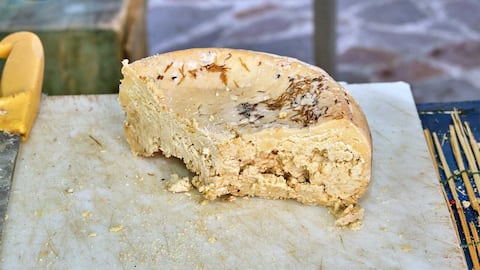Casu Marzu: Why this cheese is dangerous yet popular
What's the story
Forget blue cheese or Brie—Sardinia's Casu marzu takes the crown for the world's wildest dairy delicacy. This cheese isn't just aged; it's alive! Packed with wriggling maggots that enhance its creamy texture, 'casu marzu' is both a gastronomic dare and a cultural treasure. But there's a catch: It's illegal to sell. Yet, locals still savour this ancient cheese, passing down the tradition like a culinary secret. Casu marzu is undeniably one of Italy's most eyebrow-raising creations.
Legal status
The controversial status and consumption of Casu Marzu
Despite its peculiar production process, Casu Marzu is strictly banned from commercial sale owing to Italian laws that prohibit the consumption of parasite-infected food. However, this hasn't stopped Sardinians who've been relishing this traditional delicacy for centuries. Local gastronome Paolo Solinas describes the maggot infestation as both "the spell and delight of this cheese," with some locals even using a centrifuge to mix the maggots with the cheese before consumption.
Cultural significance
Casu Marzu: A deeply rooted Sardinian tradition
Casu marzu occupies an important place in Sardinian culture and history, journalist and gastronome Giovanni Fancello explains. He says the tradition of eating this cheese goes back to when Sardinia was part of the Roman Empire, with historical figures like "Pliny the Elder and Aristotle" talking about worm consumption. The cheese is known by different names across various sub-regions of Sardinia and is prepared using different kinds of milk.
Production and protection
The seasonal production and legal protection of Casu Marzu
The production of Casu Marzu usually occurs during the end of June, when the sheep milk changes due to reproductive cycles and summer heat create the perfect conditions for cheesemaking. Local farmer Mario Murrocu, near Alghero, keeps this tradition alive by ensuring these conditions on his farm. Although illegal since 1962, Casu Marzu is considered as a traditional product of Sardinia. Sellers face high fines if caught selling it commercially.
Health risks and the thrill factor
Why Casu Marzu is both a delicacy and a dare
Eating Casu Marzu isn't just about tasting history—it's also a test of courage. The live maggots can leap up to 15 cm when disturbed, meaning diners often wear protective eyewear. Some believe the larvae aid digestion, but health officials warn of potential risks like intestinal infections. Despite the risks, the cheese enjoys underground popularity, with locals passing it down through generations as a symbol of defiance against food regulations.
